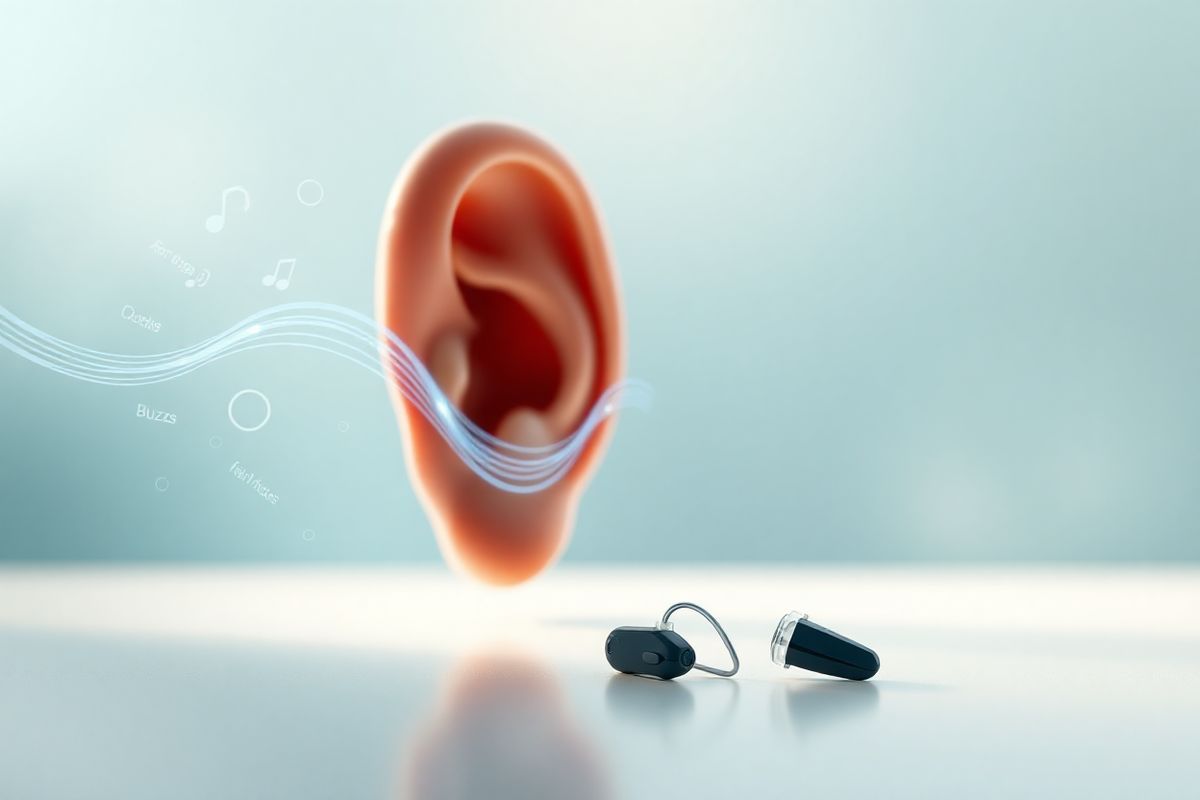Table of Contents
Understanding tinnitus: Symptoms, Causes, and Impact on Daily Life

tinnitus manifests as various auditory sensations including ringing, buzzing, hissing, or roaring sounds. Approximately 17 to 20 percent of Australians experience tinnitus to some degree, with symptoms ranging from mild annoyance to debilitating conditions that severely affect daily life (Tinnitus, n.d.). The most common causes of tinnitus include exposure to loud noises, degeneration of hair cells in the cochlea, and certain medications (Tinnitus, n.d.).
The impact of tinnitus on daily life can be profound, leading to distress, anxiety, and difficulties in concentration. Individuals may cope by avoiding loud environments and seeking relaxation techniques, but many find it challenging to manage their symptoms effectively.
The Science Behind Tinnitus: How It Affects the Brain and Hearing

tinnitus is believed to result from changes in the auditory pathways of the brain, particularly when there is a loss of auditory input, such as from hearing loss (Healthline, 2023). The brain, in response to the absence of expected stimuli, may increase its sensitivity to certain sounds, leading to the perception of tinnitus.
Research indicates that tinnitus not only affects the auditory cortex but may also involve other brain regions associated with emotional and cognitive processing (Understanding Cognitive Decline: How Your Brain Changes as You Age, n.d.). This interconnectivity suggests that tinnitus might influence cognitive functions, leading to concerns about its role in conditions like mild cognitive impairment (MCI) and dementia.
Cognitive Decline and Its Relationship with Tinnitus: What the Research Says
Cognitive decline can be characterized by mild cognitive impairment, where individuals experience noticeable memory or thinking difficulties that do not impede daily activities, or dementia, where cognitive impairments interfere with everyday functioning (Mild cognitive impairment (MCI), n.d.). Studies have shown that individuals with tinnitus have higher rates of cognitive decline, particularly in attention and memory (Kellerman et al., 2020).
A meta-analysis indicated that nearly 50% of individuals with tinnitus also experience significant cognitive difficulties (Understanding Cognitive Decline: How Your Brain Changes as You Age, n.d.). This correlation may stem from common risk factors such as age, hearing loss, and underlying health conditions that contribute to both tinnitus and cognitive decline.
Strategies for Managing Tinnitus and Supporting Cognitive Health
Managing tinnitus effectively requires a multi-faceted approach. Here are several strategies:
- Hearing Aids: For individuals with hearing loss, using hearing aids can significantly reduce the perception of tinnitus by amplifying external sounds.
- Cognitive Behavioral Therapy (CBT): CBT can help individuals change their perception of tinnitus, making it less bothersome and improving coping mechanisms (Tinnitus: Ringing in the Ears and What to Do About It, n.d.).
- sound Therapy: Utilizing background noise or white noise machines can help mask tinnitus, making it less noticeable.
- Lifestyle Adjustments: Regular exercise, a balanced diet, and stress management techniques can improve overall well-being and cognitive health.
| Strategy | Description |
|---|---|
| Hearing Aids | Amplify external sounds to reduce tinnitus perception. |
| Cognitive Behavioral Therapy | Change perception and improve coping mechanisms. |
| Sound Therapy | Use background noise or white noise to mask tinnitus. |
| Lifestyle Adjustments | Improve overall well-being through exercise, diet, and stress management. |
Seeking Help: When to Consult a Healthcare Professional about Tinnitus and Cognitive Changes
If tinnitus is persistent and affecting daily life or if there are noticeable changes in cognitive function, it is essential to consult a healthcare professional. A thorough evaluation may involve a detailed medical history, hearing tests, and cognitive assessments to determine the underlying causes and appropriate management strategies (Diagnosis and treatment, n.d.).
FAQs
What is tinnitus? Tinnitus is the perception of sound in the absence of external noise, often described as ringing, buzzing, or hissing.
Can tinnitus lead to cognitive decline? Research suggests a correlation between tinnitus and cognitive decline, particularly in attention and memory functions.
How is tinnitus treated? Treatment options include hearing aids, cognitive behavioral therapy, sound therapy, and lifestyle adjustments aimed at reducing stress and enhancing overall health.
When should I seek help for tinnitus? Seek help if tinnitus is persistent, worsening, or if you experience cognitive changes that affect your daily life.
Is there a cure for tinnitus? Currently, there is no definitive cure for tinnitus, but various management strategies can help reduce its impact on quality of life.
References
- tinnitus. (n.d.). Retrieved from https://www.betterhealth.vic.gov.au/health/conditionsandtreatments/tinnitus
- Healthline. (2023). Tinnitus: Ringing in the ears and what to do about it. Retrieved from https://www.health.harvard.edu/newsletter_article/tinnitus-ringing-in-the-ears-and-what-to-do-about-it
- Mild cognitive impairment (MCI). (n.d.). Retrieved from https://www.alzheimers.org.uk/about-dementia/types-dementia/mild-cognitive-impairment-mci
- Kellerman, R. D., et al. (2020). Diagnosis and treatment. Retrieved from https://www.mayoclinic.org/diseases-conditions/tinnitus/diagnosis-treatment/drc-20350162
- Understanding Cognitive Decline: How Your Brain Changes as You Age. (n.d.). Retrieved from https://www.healthline.com/health/cognitive-decline










